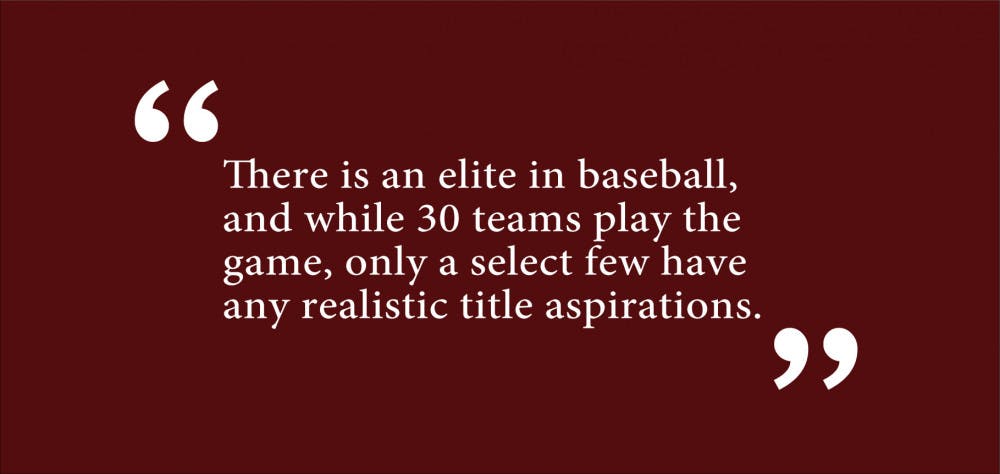It’s been nearly seven months since all 30 MLB teams broke camp with finalized rosters and plenty of lofty expectations. Now, seven months and 28 teams are gone. By the time of printing, that number may already be 29 with the 2018 season done and dusted.
But, despite all that, it doesn’t matter who wins the World Series. Red Sox or Dodgers, this year is a perfect illustration of why baseball is broken without a salary cap. Both teams started with a financial advantage that would be impossible in other sports and rode the slanted playing field all the way to the World Series. There is an elite in baseball, and while 30 teams play the game, only a select few have any realistic title aspirations.
By roster salary, the Red Sox rank first, followed closely by the second place Dodgers. Baseball is a money game, and the last few years have been no exception. The next two teams in the payroll rankings? 2017 World Champion Houston Astros and the 2016 champion Chicago Cubs.
The problem isn’t that some teams have more money — that’s true in every sport — but rather the level of the disparity. Unlike the salary cap-enforced parity of the other three major sports leagues, the NFL, NBA and NHL, the distance from first to last in baseball is staggering. The lowest-salary MLB team, the Tampa Bay Rays, could fit their player budget into each of the four aforementioned teams’ salaries six times over.
If that kind of spending inequality continues to be allowed, small market teams will never have a real chance at the championship. Milwaukee almost bucked the trend this year, but only by spending big on Lorenzo Cain and selling the farm for midseason acquisitions. Even that came up short.
The last team to build a winner through smart drafting and development rather than outspending the competition was the Royals in 2015, but that win registered as an anomaly rather than a shift in power. And the Royals’ subsequent loss of the players that got them there when financial push came to shove shows that the small-market success window is too short. Without something stronger than the current luxury tax system, which lets the rich pay extra for the privilege of extravagant spending, we’ll sit around waiting for the once in a generation team like the Royals while the big market teams win rings by the dozen.
Which brings us to the 2018 World Series. The Red Sox do have a core of players developed by their own system, but where small market teams and big market teams really differ is the ability to retain those players and build around them. As the Royals built their World Series winner, they spent away the money that could have kept Eric Hosmer and Lorenzo Cain last year. Meanwhile, Boston can keep players around with ease while still adding the likes of David Price and J. D. Martinez on huge deals. The Dodgers likewise have the money to keep a Hall of Fame talent like Clayton Kershaw when he hits the open market, where a small market team would have to let him walk.
Every team in the three other major sports leagues has to consider the cap as they go after superstars or attempt to retain their own. As players like Joc Pederson and Mookie Betts hit free agency in the coming years, Boston and L.A. should have to do the same.
Coming back to the Cubs and Astros: While those teams are hailed for building cores through the draft and savvy trades, their World Series success was dependent on spending big money to add the one or two extra pieces to win it all. Both were back in the playoffs this year, and the Astros came within three wins of another World Series berth. The two also have payrolls north of $150 million. They may have grown into contenders as underdogs, but both teams’ sustained success comes from the same flawed salary system that gave us this year’s Fall Classic. Teams like the Rays can try to bluff their way into the playoffs on tiny budgets all they like, but without a change in the system, don’t count on it proving successful.
So while it matters a great deal who wins the World Series to the fan bases of the two teams involved — and to plenty of people who hate the two teams involved — for baseball at large a coin flip would do just as well at this point. A system that almost invariably rewards big market money creates a caste system in Major League Baseball, and right now we’re seeing the top caste stomp out any competition.
It’s time for a change.
Patrick Nugent ’21 can be reached at patrick_nugent@brown.edu. Please send responses to this opinion to letters@browndailyherald.com and op-eds to opinions@browndailyherald.com.





